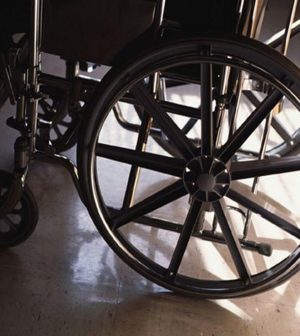- The Best Time of Day to Drink Bone Broth to Maximize Health Benefits
- 8 Ways to Increase Dopamine Naturally
- 7 Best Breads for Maintaining Stable Blood Sugar
- Gelatin vs. Collagen: Which is Best for Skin, Nails, and Joints?
- The Long-Term Effects of Daily Turmeric Supplements on Liver Health
- Could Your Grocery Store Meat Be Causing Recurring UTIs?
- Are You Making This Expensive Thermostat Error This Winter?
- Recognizing the Signs of Hypothyroidism
- 10 Strategies to Overcome Insomnia
- Could Artificial Sweeteners Be Aging the Brain Faster?
Depression Levels High Among People With Spinal Cord Injuries

Adults with spinal cord injuries have a high risk of depression, anxiety and other mental health issues — and chronic pain is a major factor, according to a new study.
Researchers analyzed private insurance claims from more than 9,000 U.S. adults with a traumatic spinal cord injury and more than 1 million people without injuries.
Their study found that mental health disorders had been diagnosed in 59% of adults with spinal cord injuries, compared with 31% of those in the general population.
“Improved clinical efforts are needed to facilitate screening of, and early treatment for, both chronic pain and psychological health in this higher-risk population,” said study lead author Mark Peterson, an associate professor of physical medicine and rehabilitation at Michigan Medicine-University of Michigan in Ann Arbor.
The findings echo previous research linking spinal cord injuries to mental health conditions.
The researchers also found that chronic pain was strongly associated with post-traumatic stress disorder, substance use disorders and other mental health conditions.
In most cases, chronic pain had a greater influence on mental health problems than living with the spinal cord injury itself, according to the findings.
They show that doctors should monitor for spinal cord patients for mental health conditions and refer them for treatment if necessary, researchers said.
They said a lack of insurance coverage and limited available services are barriers to stepped-up screening and earlier mental health treatment.
“Stakeholders need to work together to lobby for more federal research funding and special policy amendments to ensure adequate and long-term insurance coverage for both physical and mental health to meet the needs of folks living with spinal cord injuries,” Peterson said in a university news release.
The study was published recently in the journal Spinal Cord.
More information
For more on spinal cord injury, see the U.S. National Institute of Neurological Disorders and Stroke.
SOURCE: University of Michigan, news release, Feb. 7, 2022
Source: HealthDay
Copyright © 2026 HealthDay. All rights reserved.










